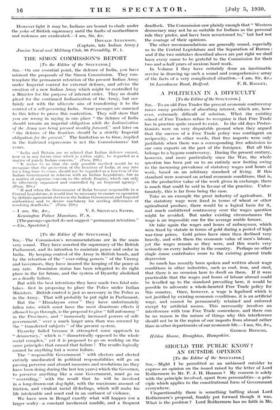[To the Editor of the SPECTATOR.]
Stn,- The Commission's recommendations are in the main Very sound. They have asserted the supremacy of the British Parlianwnt, and its intention to maintain peace and order in India. By keeping control of the Army in British hands, and by the retention of the " over-riding powers " of the Viceroy and Governors, they have insured the keeping of the peace at any rate. Dominion status has been relegated to its right Place in the far future, and the system of Dyarchy abolished as a deadly failure.
But with the best intentions they have made two fatal mis- takes--first in proposing to place the Police under Indian Ministers. British control is just as necessary in the Police as in the Army. That will probably be put right in Parliament.
But the " Himalayan error " they have unfortunately fallen into, which must have the most disastrous effects if allowed to go through, is the proposal to give " full autonomy " in the Provinces, and " immensely increased powers of self- government," over a much larger area than was covered by the " transferred subjects " of the present system.
Dyarchy failed because it attempted some approach to " democracy," which is " diametrically opposed to the whole social complex," yet it is proposed to go on working on the snow principles that caused that failure ! The results logically cannot be anything but a worse failure.
The " responsible Government " with electors and elected entirely uneducated in political responsibilities will go on passing perverse and absurd measures and resolutions (as they have been doing during the last ten years) which the Governor, to preserve anything like a sane Government, must go on " overriding," with the result that he will be involved in a long-drawn-out dog-fight, with the maximum amount of friction, and virulent racial ill-feelings, which will make his life intolerable and must end in an outburst of violence.
We have seen in Bengal exactly what will happen (on a larger scale)—a constant incoherent muddle, and a frequent deadlock. The Commission saw plainly enough that " Western deniocracy may not be as suitable for Indians as the personal rule they prefer, and have been accustomed to," but had not the courage of their opinions.
The other recommendations are generally sound, especially as to the Central Legislature and the Separation of Burma ; and if the two mistakes described above are put right we shall have every cause to be grateful to the Commission for their two and a-half years of anxious hard work.
In Volume I they have certainly done an inestimable service in drawing up such a sound and comprehensive array of the facts of a very complicated situation.—I am, Sir, &c., 16 Lansdowne Road, Bedford. F. R. BAGLEY.










































 Previous page
Previous page